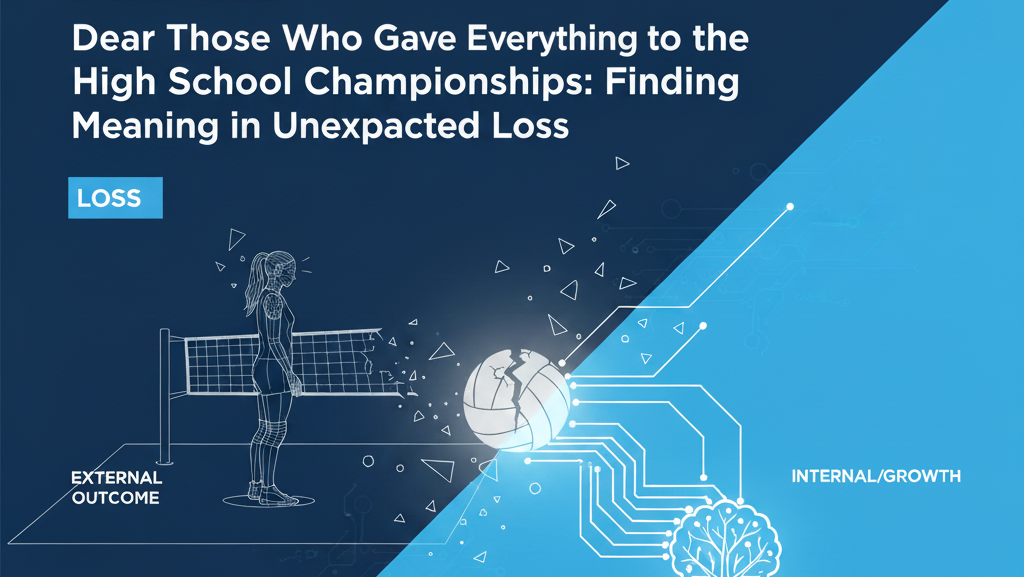Just recently, amid the global spread of COVID-19, news that would shake Japanese sports history reached me: the National High School Athletic Championships would be cancelled due to the pandemic’s impact.
This cancellation news immediately reminded me of my own senior year of high school.
The Meaning and Value of Championships for High School Seniors
I had decided to retire from active volleyball competition after my senior year championships at age 18.
Having started volleyball at age 7 and thinking about it every single day, leaving behind a sport that had been with me for two-thirds of my life was undoubtedly a major life decision.
Others might view this as an insignificant “resolution,” but for me at that time, it represented a momentous choice.
Naturally, the meaning and value of my final high school championship as a senior carried tremendous weight. Even now, remembering the pressure (self-imposed, admittedly) brings back its overwhelming intensity.
That final championship truly represented the culmination of my entire volleyball career.
Let me pause this reflection to consider a hypothetical scenario:
What would I have felt if my final high school championship had been cancelled due to circumstances like these?
Even briefly imagining this scenario is painful. My heart would have been dominated by emotions with nowhere to go, and countless overwhelming feelings would have emerged.
Now Is the Time to Consider What Sports Really Mean
Imagining the pain of current high school seniors breaks my heart. They cannot accept this reality right now, nor can they immediately move forward positively. This is completely natural, and I wouldn’t want to tell them to “keep trying!”
However, this doesn’t mean doing nothing is acceptable. There is something that can be done now: confronting this fundamental question directly:
What does playing sports mean to you?
The Meaning of Sports, Questioned Now More Than Ever
You might say it’s frustrating to be asked such a question now.
Reciting common textbook answers might be easy for 18-year-olds:
- It’s advantageous for college admissions or job hunting
- It broadens life experiences
- It promotes personal growth
None of these answers are wrong, and these aspects certainly exist.
However, doesn’t the “essential” meaning of playing sports lie somewhere completely different? Isn’t it something more pure?
I am genuinely disappointed about the cancellation of the National High School Championships.
But accepting this reality might present the perfect opportunity to deeply reconsider what sports truly means to you personally.
A Deeper Reflection on Athletic Purpose
This moment of loss, while devastating, offers a unique opportunity for profound self-examination that may not come again.
Questions for Personal Reflection:
- Strip away external expectations and societal pressures – what drew you to your sport initially?
- Beyond competition and winning, what moments in training or play brought you pure joy?
- How has your sport shaped your character in ways that transcend athletic achievement?
- What aspects of your athletic experience will remain meaningful regardless of championship outcomes?
Moving Beyond Traditional Narratives:
The conventional sports narrative focuses heavily on culminating events – championships, final games, career-defining moments. While these experiences hold genuine significance, they represent only one dimension of athletic meaning.
Consider that your years of daily practice, teammate relationships, personal breakthroughs, and character development constitute the true substance of your athletic journey. No external event can diminish or cancel these experiences.
This unexpected ending, while painful, doesn’t invalidate your dedication or diminish your growth as an athlete and person.
Note: This article was written in response to the 2020 cancellation of Japan’s National High School Athletic Championships due to COVID-19. While addressing a specific situation, the themes of finding meaning beyond competitive outcomes remain relevant for athletes facing unexpected career interruptions.
Keywords: high school sports cancellation, athletic meaning and purpose, youth athlete resilience, COVID-19 sports impact, finding purpose beyond competition, athlete identity development, sports philosophy


